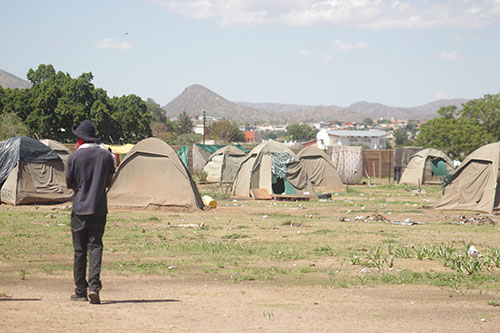Albertina Nakale
Despite being accommodated by government, and some managing to carve out a scant living, Windhoek’s growing homeless community still faces an uncertain future.
When they were rounded up in March 2020, it was generally assumed that their stay at two sports facilities would be temporary. In 2020, when the coronavirus broke out, the government, with the help of City Police, temporarily relocated those without shelter from the Khomas region to makeshift accommodation at the
Katutura Youth Complex and Khomasdal Stadium for the duration of the lockdown that affected Khomas and the Erongo regions.
A psychosocial support team under a Covid-19 task force, comprising officials from the ministries of health, gender, City Police and Khomas Regional Council, is looking into the plight of those without shelter in Windhoek.
An estimated 900 people live without shelter in Khomas. New Era on Monday visited those living at Khomasdal Stadium to see how they are coping with the challenges brought about by the rainy season and what their day looks like.
One could see soaking wet mattresses and blankets hung outside the tents to get dry due to the heavy rains that seeped through their tents. As early as 05h00 every morning, most young unemployed homeless men and women get up and go hustle for any menial job around Windhoek.
They guard cars, clean yards, cut and sell firewood, wash cars and do domestic work. Others, including expectant mothers, stay in their fading tents, scorched by the hot sun, through the years, since their relocation at the stadium.
Among three expectant mothers is one child, who started formal schooling at Hermann Gmeiner Primary School.
Speaking to a committee that represents the homeless, Elias Amalovu said although life is hard for them, they remain grateful to the government for rounding them up from the riverbeds.
“We left riverbeds, and we have tents. The tents are not enough, and they are getting old. We are unemployed. But we are talented in many areas, such as bricklaying, carpentry, gardening, welding and hairdressing. We are serious. We want to make a change so we support our families. We need work and training to improve our skills,” he spoke.
Near almost every tent, there is a small garden of tomatoes, cabbage, spinach, carrots, pumpkin, tea, watermelon and chillies, among others. Amalovu, who also owns a garden at his tent, plans to grow more produce for sale and self-consumption. Others make chairs, swings and pot plants out of old car tires to sell and make a living. A chair can fetch N$100, while a swing can go for N$70.
“I make chairs out of old tires. I encourage others to learn from my skills so they go and help others. I pick up old tires and make something out of them,” he said. The homeless are asking for good Samaritans to provide them with hosepipes to water their gardens and improve food security.
At the moment, the residents at the stadium get food parcels from the Khomas regional council monthly. However, they say the food is often delayed, and they can go to bed on a hungry stomach for days while waiting for food.
Mario Gowaseb, also a committee member, said government needs to find them a piece of land where they can build their homes, instead of living in tents for so long.
“We are tired of living here at the stadium. We need a piece of land we can call home. We have a lot of patients here suffering from chronic diseases such as TB and HIV. These people need help, especially during the rainy season. Their blankets are always soaking wet,” said Gowaseb.
So far, the residents lost four of their own, including a two-day-old baby last year due to various illnesses.
Jacky Cloete asked what the government’s plan is for keeping them at the stadium.
“They brought us here due to Covid-19. What plans do they have for us? We have a lot of talents. They keep bringing us food; we want a future. We need jobs and training,” he remarked. The committee members also observed the number of people flocking to the stadium in search of improved shelter and food is increasing.
According to Amalovu, they are 83 registered homeless people at the stadium, but the actual number of people living there is in the range of 130 people.
– anakale@nepc.com.na


